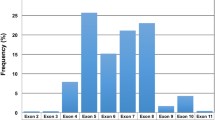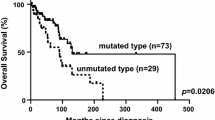Abstract
The poor prognosis of chronic lymphocytic leukemia (CLL) patients with del(17p13) is well established. Several studies have shown that cases with TP53 mutations and TP53 mutations without del(17p13) may be adverse prognostic factors. We studied 173 well-characterized CLL patients by direct sequencing to detect TP53 mutations (exons 2–11). TP53 mutations were detected in 14.5% (25 of 173) of samples. Most patients with del(17p13) had TP53 mutations (72.2%). Mutations in the absence of del(17p13) were found in 8.3% in our cohort, which were higher than other countries. Compared with cases without TP53 alterations, TP53 mutations and deletions were both associated with advanced stages and unmutated immunoglobulin heavy-chain variable region status. Survival analysis showed that the occurrence of TP53 mutations and del(17p13) were associated with shorter overall survival (OS), treatment-free survival (TFS), and resistance to chemotherapy. TP53 mutations were the variables strongly associated with OS and TFS by multivariate Cox regression analysis. Moreover, we also found that cases with TP53 mutations in the absence of del(17p13) had a similar clinical and biological course and similar poor short OS as cases carrying del(17p13) in Chinese patients with CLL.



Similar content being viewed by others
References
Xu W, Li JY, Wu YJ et al (2008) Prognostic significance of ATM and TP53 deletions in Chinese patients with chronic lymphocytic leukemia. Leuk Res 32:1071–1077
Chiorazzi N, Rai KR, Ferrarini M (2005) Chronic lymphocytic leukemia. N Engl J Med 352:804–815
Berkova A, Pavlistova L, Babicka L et al (2008) Combined molecular biological and molecular cytogenetic analysis of genomic changes in 146 patients with B-cell chronic lymphocytic leukemia. Neoplasma 55:400–408
Lin K, Sherrington PD, Dennis M et al (2002) Relationship between p53 dysfunction, CD38 expression, and IgV(H) mutation in chronic lymphocytic leukemia. Blood 100:1404–1409
Pettitt AR, Sherrington PD, Stewart G et al (2001) p53 dysfunction in B-cell chronic lymphocytic leukemia: inactivation of ATM as an alternative to TP53 mutation. Blood 98:814–822
Rossi D, Cerri M, Deambrogi C et al (2009) The prognosis value of TP53 mutations in chronic lymphocytic leukemia is independent of Del17p13. Clin Cancer Res 15:995–1004
Lozanski G, Heerema NA, Flinn IW et al (2004) Alemtuzumab is an effective therapy for chronic lymphocytic leukemia with p53 mutations and deletions. Blood 103:3278–3281
Krober A, Bloehdorn J, Hafner S et al (2006) Additional genetic high-risk features such as 11q deletion, 17p deletion, and V3-21 usage characterize discordance of ZAP-70 and VH mutation status in chronic lymphocytic leukemia. J Clin Oncol 24:969–975
Hallek M, Cheson BD, Catovsky D et al (2008) Guidelines for the diagnosis and treatment of chronic lymphocytic leukemia: a report from the international workshop on chronic lymphocytic leukemia updating the national cancer institute-working group 1996 guidelines. Blood 111:5446–5456
Dicker F, Herholz H, Schnittger S et al (2009) The detection of TP53 mutations in chronic lymphocytic leukemia independently predicts rapid disease progression and is highly correlated with a complex aberrant karyotype. Leukemia 23:117–124
Zenz T, Habe S, Denzel T et al (2009) Detailed analysis of p53 pathway defects in fludarabine-refractory chronic lymphocytic leukemia (CLL): dissecting the contribution of 17p deletion, TP53 mutation, p53–p21 dysfunction, and miR34a in a prospective clinical trial. Blood 114:2589–2597
Zenz T, Eichhorst B, Busch R et al (2010) TP53 mutation and survival in chronic lymphocytic leukemia. J Clin Oncol 28:4473–4479
Mayr C, Speicher MR, Kofler DM et al (2006) Chromosomal translocations are associated with poor prognosis in chronic lymphocytic leukemia. Blood 107:742–751
Thornton PD, Gruszka-Westwood AM, Hamoudi RA et al (2004) Characterisation of TP53 abnormalities in chronic lymphocytic leukaemia. Hematol J 5:47–54
Grever MR, Lucas DM, Dewald GW et al (2007) Comprehensive assessment of genetic and molecular features predicting outcome in patients with chronic lymphocytic leukemia: results from the US Intergroup Phase III Trial E2997. J Clin Oncol 25:799–804
Zenz T, Krober A, Scherer K et al (2008) Monoallelic TP53 inactivation is associated with poor prognosis in chronic lymphocytic leukemia: results from a detailed genetic characterization with long-term follow-up. Blood 112:3322–3329
Grever MR, Lucas DM, Johnson AJ, Byrd JC (2007) Novel agents and strategies for treatment of p53-defective chronic lymphocytic leukemia. Best Pract Res Clin Haematol 20:545–556
Best OG, Gardiner AC, Majid A et al (2008) A novel functional assay using etoposide plus nutlin-3a detects and distinguishes between ATM and TP53 mutations in CLL. Leukemia 22:1456–1459
Sturm I, Bosanquet AG, Hermann S et al (2003) Mutation of p53 and consecutive selective drug resistance in B-CLL occurs as a consequence of prior DNA-damaging chemotherapy. Cell Death Differ 10:477–484
Petitjean A, Mathe E, Kato S et al (2007) Impact of mutant p53 functional properties on TP53 mutation patterns and tumor phenotype: lessons from recent developments in the IARC TP53 database. Hum Mutat 28:622–629
Soussi T, Asselain B, Hamroun D et al (2006) Meta-analysis of the p53 mutation database for mutant p53 biological activity reveals a methodologic bias in mutation detection. Clin Cancer Res 12:62–69
Acknowledgments
This study was supported by National Natural Science Foundation of China (30871104, 30971295, 30971296), Jiangsu Province’s Outstanding Medical Academic Leader Program (LJ200623), Jiangsu Province’s Medical Elite Program (RC2007042), and National Science and Technology Pillar Program (2008BAI61B01).
Conflict of interest
The authors declare no conflict of interest.
Author information
Authors and Affiliations
Corresponding authors
Rights and permissions
About this article
Cite this article
Dong, HJ., Zhou, LT., Zhu, DX. et al. The prognostic significance of TP53 mutations in Chinese patients with chronic lymphocytic leukemia is independent of del(17p13). Ann Hematol 90, 709–717 (2011). https://doi.org/10.1007/s00277-010-1125-8
Received:
Accepted:
Published:
Issue Date:
DOI: https://doi.org/10.1007/s00277-010-1125-8




